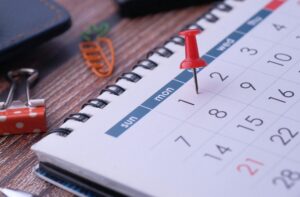Mastering Tomorrow Starts Tonight!
Consider tomorrow’s actions the night before and set yourself up for success. Make your future lives easier and focus your brainpower on the things that matter.
Make life easier for yourself by taking actions for tomorrow. Then you don’t have to decide as much during the day, freeing up precious brainpower! I once heard that anxious people worry about the future and the unknown. I advocate for living in the future just a little bit. I don’t want to cause undue stress or worry, but by living in the future, we can direct our attention more to the present.
Consider two people, both music teachers, who have similar travel times to work and similar family structures.

Person A’s Routine:
- Gets up with just enough time to quickly shower.
- Spends a few minutes deciding on clothes.
- Fixes hair or makeup.
- Packs their bag, if applicable.
- Stops at Starbucks for coffee and a sandwich.
- Rolls into work with just enough time.

Person B’s Routine:
- Begins the night before.
- Picks out clothes for the next day and puts them at the end of the closet.
- Packs breakfast and lunch for the next day.
- Packs the school bag with any items needed for the next day.
- Preps the coffee machine to just press “start” in the morning.
- Wakes up a little earlier to avoid stress.
No one plans on having accidents or emergencies. Person A is by no means out of control. He will get the job done, albeit with a very tight timeline. However, on days with more traffic or spilled coffee or any variation in his routine, he may be off kilter for several days afterward.
Benefits of Person B’s Approach:
- Avoids or better manages variations in the morning routine.
- Chooses temporary discomfort in prepping the night before.
- Reduces stress and wasting mental energy.
By living a little bit in the future — preparing just enough to eliminate making decisions when we should be acting — we remove stress and wasting mental energy resources. Often, the earliest hours of the day are our most productive times. We could be using this energy to prepare for our lessons, think through our actions in class, or even enjoy some music, an audiobook or a podcast on the way to work. Instead, many of us frantically miss this time in the morning because there is just too much to do in a short period of a time.
Here are five areas to start tomorrow tonight!

1. Evening Preparation Tips
- Plan your sleep: Many of us stay up too late, bring our phones into our bedrooms or watch TV when our bodies tell us to wind down. Avoiding these things can lead to better sleep.
- Prepare clothes and meals: Choose your next day’s clothes and prepare or plan your breakfast ahead of time.
- Pack your work bag: Pack your work bag in advance to avoid rushing in the morning.
- Prep your coffee machine: Prepare your coffee machine for quick use in the morning.

2. Setting Boundaries
- Wake up earlier: Waking up 10 to 15 minutes earlier is less stressful than running 10 to 15 minutes late.
- Avoid checking email before work: Don’t check emails before work; your email inbox is simply a to-do list that others add to.
- Prioritize core job tasks: If you’re a new teacher, your only job is to get your ensemble to sound good and to get rehired for next year!
- Take a defined lunch break: Don’t schedule meetings during lunch or catch up on emails.
Eat well, prepare for the next day, get a good night’s sleep, rinse and repeat — many see this life as boring. After all, we’re adults and free — why should we be so disciplined and live under such a restrictive routine? We fail to realize that discipline is freedom. Instead of seeing a lack of excitement, highlight what we get to do when we have a disciplined routine.

3. Create a Routine
- Set morning rules: Don’t check emails at night or before work and prep what you can the night before.
- Control your breakfast: Prepare your breakfast for quick use in the morning.
- Organize your work bag: Have your bag ready or even leave it in the car.
- Separate work and personal time: Take your lunch seriously and don’t take personal calls during work time.

4. Understand that Discipline = Freedom
- Time for yourself: If you don’t set a routine, you aren’t taking your time seriously. If you’re not taking your time seriously, everyone else will notice. People are generally good, but they are also resource hogs. If you don’t use your time wisely and for yourself, you might as well give some of your time to others.
- Avoid overworking: Busy and overworked mean being out of control. Our profession celebrates those who constantly work and don’t draw lines in the sand. If you don’t take control of your time, someone or something else will.
Let’s look at what discipline gets you. Set some rules for your mornings. Don’t check emails before work. Prep what you can the night before. Your breakfast only needs to be microwaved in the morning. It may not be as tasty as Starbucks, but you control it, it gets the job done, and it’s reliable.
Grab your pre-packed bag as you head out the door or consider putting it in the car the night before. Another option: Don’t bring anything home from school in order to draw the line. Get to work and do your work at work. Don’t take personal calls or waste your time or others. Prioritize your work, not others’ work.
Your main job is getting your ensembles to sound good and working on getting rehired for the next year. Take your lunch break and take it seriously. After lunch, get back to work until your workday ends, either with the end of school or after a rehearsal.
And then go home.
Your work obligations at home may consist of getting your clothes, coffee and food ready for the next morning. But the rest of the time at home until the next morning is your time. And you should consider at this time as sacred just like your work time.
We are music educators; we are not on call all night, and we do not hold nuclear launch codes. We work hard for the children, and by all means, this work is important, but make sure you don’t use this as an excuse for simply not knowing what to do with the free time that you do have.

5. Conduct a Weekly Routine Review
- Review and adjust: Conduct a weekly review of your routine to ensure that it’s working for you.
- Set goals: Set achievable goals for your work and personal life.
- Reflect on progress: Reflect on your progress and make necessary adjustments.
This is definitely not new advice, and there will be some people who will argue against many of my tips. . However, my goal is to help you combat the notion that this job cannot be done unless you work from dawn until late into the evening. Not true!
One of my friends shifted to only working during work hours. She flat out ignored work outside of the workday. Later that year, her ensemble was accepted to perform at the state convention, a first for her and the school. Was the sole reason for this achievement the strict boundaries she set? Of course not. All music educators know that most seemingly overnight successes take 10 to 15 years to accomplish. Yet, this was a year that my friend was able to focus on the time allotted at work. When we buy into the idea that we have all the time in the world (in other words, working late hours and on weekends), we tend to treat our scheduled work time with much less importance and urgency.
I can’t guarantee a ticket for your ensemble to perform at state conventions, but I can suggest that if you realize you only have a finite amount of face-to-face rehearsal time with your students, you’ll probably change the way you structure your time. And, most importantly, there must be some time in there for yourself.
________________________________________
12-Step Checklist
- Choose next day’s clothes the night before.
- Prepare or plan breakfast ahead of time.
- Pack your work bag in advance.
- Wake up 10-15 minutes earlier.
- Prep the coffee machine for quick use.
- Avoid checking email before work.
- Prioritize core job tasks.
- Take a defined lunch break.
- Set clear work and personal time boundaries.
- Plan for the next day in the evening.
- Limit electronics before bedtime.
- Conduct a weekly routine review.















